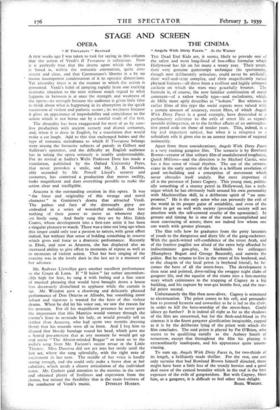STAGE AND SCREEN
OPERA
Il Trovatore " Revived A FEW weeks ago I was taken to task for saying in this column that the action of Verdi's Il Trovatore is ridiculous. Now it is perfectly true that the drama upon which the opera is based is, within the romantic convention, quite con- sistent and clear, and that Canunarano's libretto is a by no means incompetent condensation of it to operatic dimensions. Yet absurdity there is in the manner in which the action is presented. Verdi's habit of jumping rapidly from one exciting dramatic situation to the next without much regard to what happens in between is at once the strength and weakness of the opera—its strength because the audience is given little time to think about what is happening in its absorption in the quick succession of violent and pathetic scenes ; its weakness because it gives an appearance of improbability and coincidence to the action which is not borne out by a careful study of the text.
The absurdity has been exaggerated for most of us by care- less production with ancient scenery and dismal costumes, and, when it is done in English, by a translation that would make a cat laugh. Add to this that exchanged babies and the type of romantic melodrama to which 11 Trovatore belongs were among the favourite subjects of parody in Gilbert and Sullivan's operettas, and the difficulty an English audience has in taking the opera seriously is readily understandable. For its revival at Sadler's Wells Professor Dent has made a translation, published by the Oxford University Press, that never provokes a smile, and Mr. J. B. Gordon, ably seconded by Mr. Powell Lloyd's scenery and costumes, has contrived a production that moves swiftly, looks magnificent and does everything possible to make the action clear and intelligible.
Azucena is the outstanding creation in this opera. It was " the force and originality of this strange and novel character " in Gutierrez's drama that attracted Verdi. The pathos and fury of the distraught gipsy are embodied in a series of wonderful melodies that lose nothing of their power to move us whenever they are finely sung. And finely sung they are by Miss Edith Coates, whose development into a first-rate artist it has been a singular pleasure to watch. There was a time not long ago when this singer could only tear a passion to tatters, with great effect indeed, but without that sense of holding something in reserve which gives real force to a dramatic performance. Recently as Eboli, and now as Azucena, she has displayed also an increased ability to give effect to moments of repose as well as to moments of violent action. That her best singing of the evening was in the lovely duet in the last act is a measure of her advance.
Mr. Redvers Llewellyn gave another excellent performance as the Count di Luna. If " Il balen " lay rather uncomfort- ably high for him, he sang it with feeling and a fine sense of musical phrasing that would have brought down a house less decorously disinclined to applause while the curtain is up. Mr. Wendon gave a charming and delicately phrased performance of Don Ottavio or Alfredo, but something more robust and vigorous is wanted for the hero of this violent drama. When he did let his voice out, we saw the reason for his restraint. For all his magnificent presence he never gave the impression that this Manrico would venture through the enemy's lines to serenade his lady, or would proudly tell us (rather than Azucena, who had spent two months dressing them) that his wounds were all in front. And I beg him to discard that bloody bandage round his head, which gave me a horrid presentment that at any moment he would get up and recite " The Absent-minded Beggar " or treat us to the poilu's song from Mr. Farjeon's recent revue at the Little Theatre. Miss Dusseau did not get into her stride until the last act, where she sang splendidly, with the right note of excitement in her tone. The middle of her voice is hardly strong enough, and she could only make a brave shot at her cabaletta, which needs a clearer articulation of the individual notes. Mr. Corbett paid attention to the niceties in the score and obtained plenty of liveliness and expression from the chorus, but missed the flexibility that is the main business of the conductor of Verdi's music. DYNELEY HUSSEY.










































 Previous page
Previous page